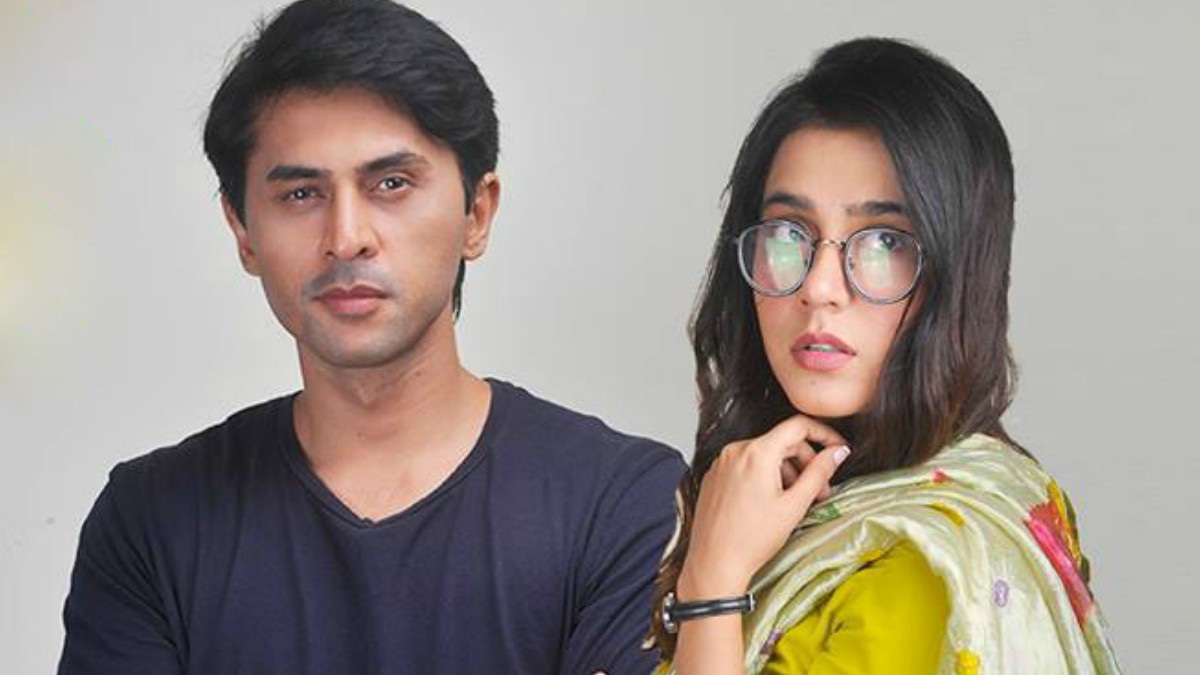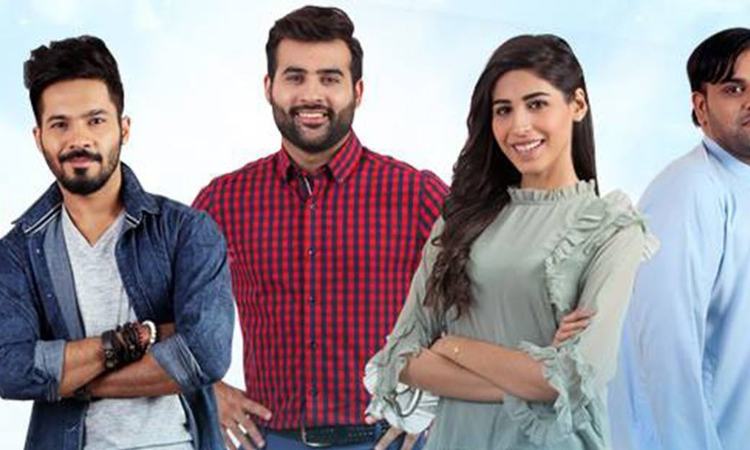7 reasons why Angan may be the most subversive Pakistani drama you've ever seen
ARY Digital’s Angan appears to be a regular drama on the surface; a traditional family story with the requisite number of awkward chachis, annoying susraalis and interfering damaads that haunt almost every family we know.
Stories set in a joint family system have been missing from our screens of late and Angan brings this familiar genre back to life with a lot of sweetness and humour.
This well-made serial has some truly hilarious moments, thanks to the attention-seeking son-in-law from hell, Alauddin (Waseem Abbas), and the completely unfiltered commentary of the clan’s elderly parents played by the always brilliant Qavi Khan and Samina Ahmed.
However, this is no simple comedy. The story actually touches on a lot of serious topics, skillfully questioning both societal norms and many of the stereotypes our dramas love to perpetuate in pursuit of ratings. This may well be one of the most quietly subversive dramas to air and here's why:
1) The born-again molvi isn't all-knowing nor is he given more importance than he deserves
There is a born-again molvi character on the show and absolutely no one is impressed by him, but most importantly no one is afraid of him. Played by the brilliant Paras Masroor, he is what can only be termed as work-shy or hadd haram in Punjabi.
He uses religion as an excuse not to do a full day’s work in any given week, because he is either thinking about God or off to do deen ka kaam. He is constantly making pronouncements and judgments about how haram or unacceptable things are, while completely ignoring the needs of his own wife and children.The funniest part is that while he is off trying to earn jannat, his extended family of not-so-perfect Muslims is actually covering for him; taking care of his and his family’s needs, which is much closer to the actual spirit of Islam than merely spouting dialogues and criticising people.
While the born-again molvi is off trying to earn jannat, his extended family of not-so-perfect Muslims is actually covering for him; taking care of his and his family’s needs, which is much closer to the actual spirit of Islam than merely spouting dialogues and criticising people.
One of the best things about this serial is that no one is willing to give the molvi’s character more authority than he deserves just because he uses religious symbolism to puff himself up. The entire family, from his father to his youngest niece, is not afraid to reason with him or to point out his little hypocrisies. The cherry on the top is when his elder brothers force him to work for his bhabi, so the molvi has to reluctantly learn how to take directions from a woman.
2) A single woman isn't a tragic character and her younger suitor isn't a problem either
There is a woman over 25 in this drama and she isn’t angry, boring or a tragedy queen. Mansha Pasha plays the lovely Zoya, who is the last of her family to find a match. She is a kind, friendly sort who writes for a hobby and doesn’t consider herself a victim if she helps her bhabis in the kitchen.
In one wonderful episode, the young man meant for her much younger niece falls in love with this sensible young woman instead, and the fact she is a few years older than him isn’t a deal breaker. Fair warning that this may shock a lot of regular drama watchers who are used to seeing wealthy, much older men choosing to marry ditzy, bholi larkiyan barely out of school as the norm for romance in our dramas.

3) Childless couples aren't mournful all day
There is a childless couple on the show and though they would love to have a baby, their lives are not blighted by that one fact. The husband is neither threatening to find another woman nor does anyone in the household think this is the perfect chance to bring about a doosri biwi plot twist. The childless Laila actually becomes friends with her over fertile younger devrani and does her best to help her with the kids instead of getting caught up in a bitter feud.
4) Women get along in this drama
The most subversive idea in this entire drama may be the fact that the old trope of “aurat, aurat ki dushman hai” is not played out at all. When the educated Laila and the unschooled Rubina fight, instead of taking advantage of being the eldest bhabi, Hajra actually makes peace between them and teaches them to get along.
So unlike most of our dramas, there is neither a Machiavellian mastermind preying on everyone else’s weaknesses nor are the other family members stupid enough to allow such a circumstance. There are arguments, there are rivalries and there are big fights but there is also a beautiful thread of affection and good-hearted generosity that binds everyone together, especially the women. When nourished, it is this sense of cooperation and sisterhood that actually keeps real families functioning, despite every difficulty.

5) Bad luck with love is resolved without conflict
In another revolutionary move, this may be one of the few dramas in which the women are not fighting over a man. When the aunt gets a marriage proposal over her younger niece, it isn’t the start of a blood feud. The niece doesn’t swear revenge; in fact, she sits her parents down and helps them get over it and wishes the new couple well. Most importantly, the niece moves on; she isn’t waiting for her aunt to die, get divorced or not have kids so she can become a doosri biwi, which is considered a normal reaction in our dramas.
When the aunt gets a marriage proposal over her younger niece, it isn’t the start of a blood feud. How refreshing.
Oh, and when another young cousin is disappointed in love her mother actually tells her there are plenty of fish in the sea and she doesn’t have to pine away for a young man not in the least bit interested in her. This is that rare Pakistani drama where women have a deep, intrinsic feeling of self-respect that doesn’t require constant conversations about love, men and marriage to feel happy.
6) Men know how to treat their wives or girlfriends well
There are no toxic males to provide the kind of violent, stalker-like behaviour that passes for romance these days. The husbands are for the most part loving, caring men, who listen to their wives and their parents. They understand the pressure their wives are under and instead of intimidating or ignoring them they try to understand and appreciate them. Similarly, the young men in this serial are very concerned with the feelings of the girls they love and approach the issue of marriage with respect and consideration.
7) Social media is shown for what it is
Joining Facebook may not actually bring families closer together. Social media allows a window into our relatives' lives but it doesn’t necessarily bring us closer together. Families divided by distance may find their values change to fit in with the society they live in, so what a young man in America thinks is acceptable may not always align with the thinking of a grandfather sitting in Lahore.
So if anyone is looking for a show that is not only intelligent but actually entertaining, this is your answer. Writer Faiza Iftikhar has written a script that turns a lot of preconceived notions about middle-class life on their heads. As with all her work, the author comes at the audience with wry, sideways glance at life. Rather than preaching or lecturing, Iftikhar plays with the norms and biases that society holds dear, gently teasing them out so we can see exactly how useful or useless they really are.
The script is also bolstered by a lot of great performances from a well-chosen cast including Iffat Umer, Uzma Hassan, Zainab Qayoom and Irsa Ghazal. In his second outing as a director, Qasim Ali has woven this story together with a quiet charm and simplicity but at times we wish he had kept the pace and tension a little sharper. Angan gives us a fresh look at family life, showing us that dramas don’t have to follow the same dysfunctional tropes and tired old storylines to be entertaining.














Comments